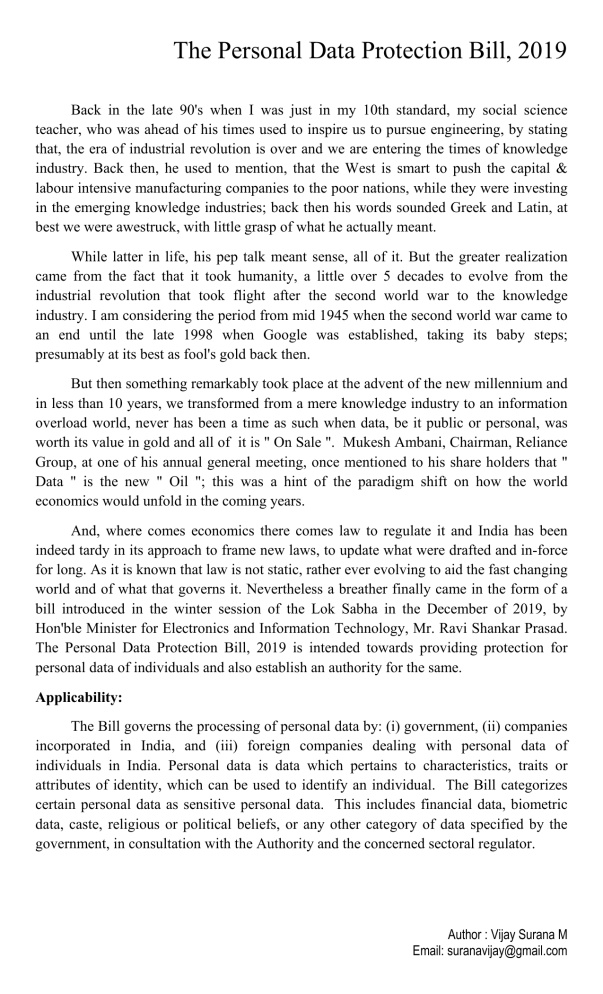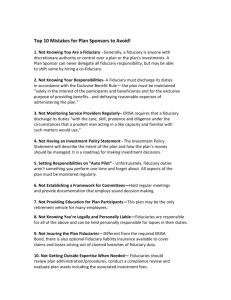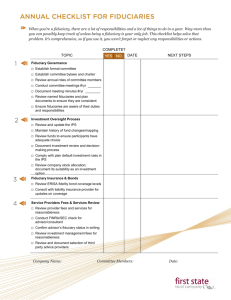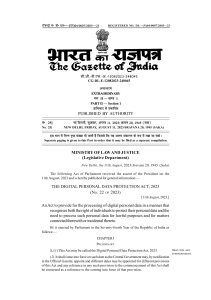
The Personal Data Protection Bill, 2019 Back in the late 90's when I was just in my 10th standard, my social science teacher, who was ahead of his times used to inspire us to pursue engineering, by stating that, the era of industrial revolution is over and we are entering the times of knowledge industry. Back then, he used to mention, that the West is smart to push the capital & labour intensive manufacturing companies to the poor nations, while they were investing in the emerging knowledge industries; back then his words sounded Greek and Latin, at best we were awestruck, with little grasp of what he actually meant. While latter in life, his pep talk meant sense, all of it. But the greater realization came from the fact that it took humanity, a little over 5 decades to evolve from the industrial revolution that took flight after the second world war to the knowledge industry. I am considering the period from mid 1945 when the second world war came to an end until the late 1998 when Google was established, taking its baby steps; presumably at its best as fool's gold back then. But then something remarkably took place at the advent of the new millennium and in less than 10 years, we transformed from a mere knowledge industry to an information overload world, never has been a time as such when data, be it public or personal, was worth its value in gold and all of it is " On Sale ". Mukesh Ambani, Chairman, Reliance Group, at one of his annual general meeting, once mentioned to his share holders that " Data " is the new " Oil "; this was a hint of the paradigm shift on how the world economics would unfold in the coming years. And, where comes economics there comes law to regulate it and India has been indeed tardy in its approach to frame new laws, to update what were drafted and in-force for long. As it is known that law is not static, rather ever evolving to aid the fast changing world and of what that governs it. Nevertheless a breather finally came in the form of a bill introduced in the winter session of the Lok Sabha in the December of 2019, by Hon'ble Minister for Electronics and Information Technology, Mr. Ravi Shankar Prasad. The Personal Data Protection Bill, 2019 is intended towards providing protection for personal data of individuals and also establish an authority for the same. Applicability: The Bill governs the processing of personal data by: (i) government, (ii) companies incorporated in India, and (iii) foreign companies dealing with personal data of individuals in India. Personal data is data which pertains to characteristics, traits or attributes of identity, which can be used to identify an individual. The Bill categorizes certain personal data as sensitive personal data. This includes financial data, biometric data, caste, religious or political beliefs, or any other category of data specified by the government, in consultation with the Authority and the concerned sectoral regulator. Author : Vijay Surana M Email: suranavijay@gmail.com The Personal Data Protection Bill, 2019 Obligations of data fiduciary: A data fiduciary is an entity or individual who decides the means and purpose of processing personal data. Such processing will be subject to certain purpose, collection and storage limitations. For instance, personal data can be processed only for specific, clear and lawful purpose. Additionally, all data fiduciaries must undertake certain transparency and accountability measures such as: (i) implementing security safeguards (such as data encryption and preventing misuse of data), and (ii) instituting grievance redressal mechanisms to address complaints of individuals. They must also institute mechanisms for age verification and parental consent when processing sensitive personal data of children. Rights of the individual: The Bill sets out certain rights of the individual (or data principal). These include the right to: (i) obtain confirmation from the fiduciary on whether their personal data has been processed, (ii) seek correction of inaccurate, incomplete, or out-of-date personal data, (iii) have personal data transferred to any other data fiduciary in certain circumstances, and (iv) restrict continuing disclosure of their personal data by a fiduciary, if it is no longer necessary or consent is withdrawn. Grounds for processing personal data: The Bill allows processing of data by fiduciaries only if consent is provided by the individual. However, in certain circumstances, personal data can be processed without consent. These include: (i) if required by the State for providing benefits to the individual, (ii) legal proceedings, (iii) to respond to a medical emergency. Social media intermediaries: The Bill defines these to include intermediaries which enable online interaction between users and allow for sharing of information. All such intermediaries which have users above a notified threshold, and whose actions can impact electoral democracy or public order, have certain obligations, which include providing a voluntary user verification mechanism for users in India. Data Protection Authority: The Bill sets up a Data Protection Authority which may: (i) take steps to protect interests of individuals, (ii) prevent misuse of personal data, and (iii) ensure compliance with the Bill. It will consist of a chairperson and six members, with at least 10 years’ expertise in the field of data protection and information technology. Orders of the Authority can be appealed to an Appellate Tribunal. Appeals from the Tribunal will go to the Supreme Court. Author : Vijay Surana M Email: suranavijay@gmail.com The Personal Data Protection Bill, 2019 Transfer of data outside India: Sensitive personal data may be transferred outside India for processing if explicitly consented to by the individual, and subject to certain additional conditions. However, such sensitive personal data should continue to be stored in India. Certain personal data notified as critical personal data by the government can only be processed in India. Exemptions: The central government can exempt any of its agencies from the provisions of the Act: (i) in interest of security of state, public order, sovereignty and integrity of India and friendly relations with foreign states, and (ii) for preventing incitement to commission of any cognizable offence (i.e. arrest without warrant) relating to the above matters. Processing of personal data is also exempted from provisions of the Bill for certain other purposes such as: (i) prevention, investigation, or prosecution of any offence, or (ii) personal, domestic, or (iii) journalistic purposes. However, such processing must be for a specific, clear and lawful purpose, with certain security safeguards. Offences: Offences under the Bill include: (i) processing or transferring personal data in violation of the Bill, punishable with a fine of Rs 15 crore or 4% of the annual turnover of the fiduciary, whichever is higher, and (ii) failure to conduct a data audit, punishable with a fine of five crore rupees or 2% of the annual turnover of the fiduciary, whichever is higher. Re-identification and processing of de-identified personal data without consent is punishable with imprisonment of up to three years, or fine, or both. Sharing of non-personal data with government: The central government may direct data fiduciaries to provide it with any: (i) nonpersonal data and (ii) anonymised personal data (where it is not possible to identify data principal) for better targeting of services. Amendments to other laws: The Bill amends the Information Technology Act, 2000 to delete the provisions related to compensation payable by companies for failure to protect personal data. Right to Be Forgotten: The data principal shall have the right to restrict or prevent continuing disclosure of personal data by a data fiduciary . The bill has been referred to the standing committee for its report and the same was expected by the first day of the last week of the budget session, 2020; however with the prevailing challenges posed by the Covid19 pandemic, we will have to wait for further development in this regard. Author : Vijay Surana M Email: suranavijay@gmail.com





![Mark Whitenack Digital Assets PowerPoint Presentation []](http://s2.studylib.net/store/data/005383425_1-9cf830a5f2e9fc777daa963eb9460c8e-300x300.png)
